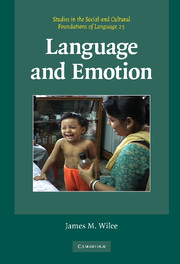Book contents
- Frontmatter
- Contents
- List of figures
- List of transcripts
- Acknowledgements
- Introduction
- Part I Theory
- Part II Language, power, and honor
- Part III Identification and identity
- Part IV Histories of language and emotion
- 9 A history of theories
- 10 Shifting forms of language and emotion
- 11 Language and the medicalization of emotion
- 12 Conclusion
- Notes
- Glossary
- References
- Index
- STUDIES IN THE SOCIAL AND CULTURAL FOUNDATIONS OF LANGUAGE
11 - Language and the medicalization of emotion
Published online by Cambridge University Press: 05 June 2012
- Frontmatter
- Contents
- List of figures
- List of transcripts
- Acknowledgements
- Introduction
- Part I Theory
- Part II Language, power, and honor
- Part III Identification and identity
- Part IV Histories of language and emotion
- 9 A history of theories
- 10 Shifting forms of language and emotion
- 11 Language and the medicalization of emotion
- 12 Conclusion
- Notes
- Glossary
- References
- Index
- STUDIES IN THE SOCIAL AND CULTURAL FOUNDATIONS OF LANGUAGE
Summary
Introduction
In Part II, I explored the relations of language, power, and emotionality. Some say that power relations determine the bounds of sanity and madness, but this is an oversimplification. In this chapter I explore a Foucaultian theme – claims that the “psy disciplines” (N. Rose 1996, i.e., psychiatry, the first to emerge, and allied disciplines) have a growing, global influence on conceptualizations of emotion, and even on subjectivity. This impact is mediated through the treatment of ostensibly pathological states and patterns of feeling.
Before proceeding, I acknowledge a debt to Gregory Bateson (1972), whose insight into reflexivity (metacommunication, framing) and schizophrenia make him an important ancestor for a linguistically sensitive anthropology of mental illness.
The psy disciplines, writes Rose
have not only been able to supply a whole variety of models of selfhood but also to provide practicable recipes for action in relation to the government of persons by professionals in different locales. … It has become impossible to conceive of personhood, to experience one's own or another's personhood, or to govern oneself or other's without psy (N. Rose 1996: 34).
Rose writes with the peculiar confidence of those who are not in the business of ethnographically, or cross-culturally, testing such questions of influence. Are there good grounds to believe Rose?
As my discussion of what I call “psychiatry's magic complex” (later in this chapter) indicates, there are reasons to doubt Rose's claims. Yet many share his perspective. More and more communities are encountering a new register that deals not only with emotion, but with politics, ritual traditions, etc. The register signals what philosopher Alasdair MacIntyre calls “emotivism,” a plague on modern logic (1980).
- Type
- Chapter
- Information
- Language and Emotion , pp. 168 - 181Publisher: Cambridge University PressPrint publication year: 2009

